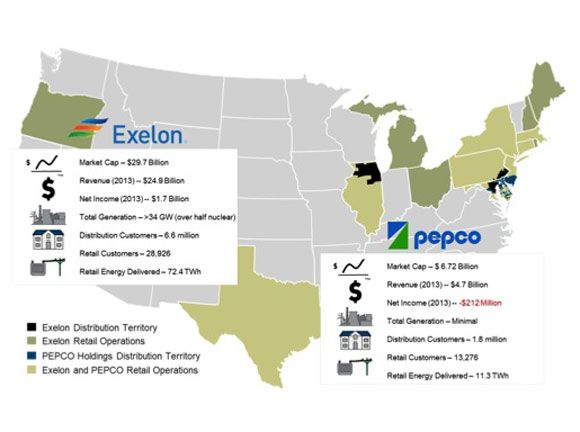Exelon Corporation (NYSE: EXC) announced on Wednesday that it will acquire Pepco Holdings (NYSE: POM) in a $6.8 billion all-cash transaction to create a mega-utility serving the Mid-Atlantic and Midwest.
The new company will be the largest utility in the U.S. in terms of customers served. Exelon owns Baltimore Gas & Electric, Commonwealth Edison and PECO, while Pepco Holdings’ electric and gas utilities include Atlantic City Electric, Delmarva Power and Pepco.

Source: GTM Research
Exelon pointed to increased reliability as a major outcome of the acquisition, noting that BGE’s reliability metrics have reached their best-ever levels since the company became part of Exelon.
“As part of this transaction, Exelon has committed to provide what our customers most want: investments in infrastructure improvements, continuation of our long tradition of philanthropy in our communities and direct customer benefits of $100 million,” Joseph Rigby, CEO of Pepco Holdings, said in a statement.
Two years ago, Exelon merged with Constellation Energy, which then owned BGE, in a nearly $8 billion deal that gave Exelon a reach into 38 states and parts of Canada. But it was soon eclipsed by another mega-merger in the utility sector. Later in 2012, Duke Energy merged with Progress Energy to become the largest regulated utility in the U.S. with approximately 7 million customers in six states. With the announcement on Tuesday, the new Exelon will serve about 10 million customers and have a rate base of about $26 billion.
These larger mergers are coming at a time of low natural gas prices and increased energy efficiency, which are two factors that have resulted in shrinking revenues for generation utilities. Exelon produces more than half its 34,700 megawatts of its capacity from nuclear power and was looking to add another regulated utility that gets more steady returns for its investments to its portfolio.
"This acquisition supports an integrated utility model with a balanced mix of regulated and non-regulated cash flows," said Exelon CEO Chris Crane during a briefing call.
Exelon and Pepco already have regional synergies in the Mid-Atlantic that should allow the companies to streamline some back office functions and share lessons learned across the two companies' urban utilities that have invested in technologies such as smart meters, distribution automation and advanced outage management systems.
“The combined Exelon and Pepco Holdings’ regulated arm will be able to combine expertise in meeting goals set by three of the most progressive public utility commissions in the country, integrating higher penetrations of centralized and distributed solar from Atlantic City Electric, and wide deployment of distribution automation at Commonwealth Edison,” said Ben Kellison, senior grid analyst with GTM Research.
“Exelon and Pepco Holdings have a compelling strategic rationale for merging, given our geographic proximity and similar utility business models,” Crane said in a statement. He added during the briefing call that Exelon is still looking at other investments on the generation side, including renewable energy. "This does not preclude us from other opportunities on the other side of the business," he said.
The deal will pay $27.25 per share for Pepco Holdings, a nearly 25 percent premium over its April 25, 2014 closing price. Exelon CEO Chris Crane will remain as president and CEO of the combined company and Pepco will retain its regional headquarters.
The merger is subject to approval from the Federal Energy Regulatory Commission, an antitrust review, and approval by public service commissions in the states where Pepco operates. The companies hope to close in the second or third quarter of 2015.



